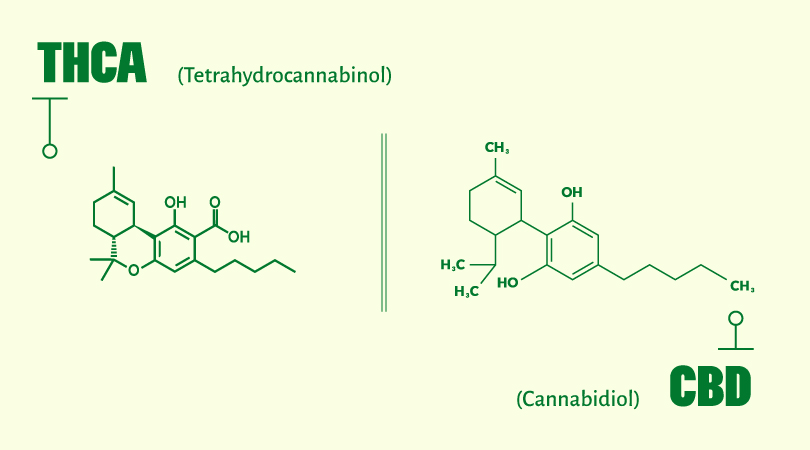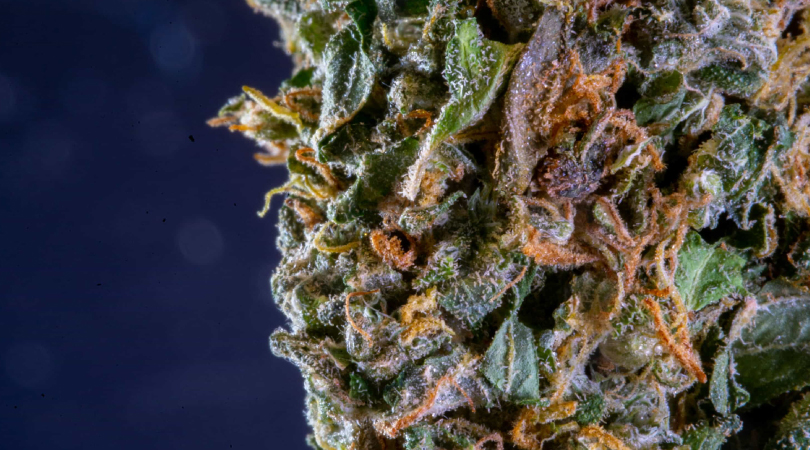Cannabis is packed with different compounds that each have their own effects on your body. Some provide relaxation, others help with discomfort, and some—like THCa—can get you high. If that’s what you’re looking for, THCa might be your best bet. But let’s take a closer look at the differences and similarities between THCa and CBD. Are they both legal? What are their effects? Can you use them at the same time? Keep reading for this & more!

What’s THCa?
If you’ve ever wondered, “What does THCa stand for?”, the answer is simple: Tetrahydrocannabinolic acid. It’s the raw, unheated form of THC, the compound responsible for cannabis’s psychoactive effects. Like any other psychoactive cannabis product, before heating it, THCa doesn’t get you high, but once it’s exposed to heat (a process called decarboxylation), it transforms into THC. That’s when it delivers the well-known euphoric effects associated to cannabis.
How Does THCa and THC Interact with Your Body?
When THCa is consumed in its raw form, it doesn’t bind directly to cannabinoid receptors in the brain the way THC does. That’s why raw cannabis, or THCa, won’t get you high. But once it’s heated and becomes THC, it interacts with the CB1 receptors in your brain, leading to psychoactive effects like euphoria, relaxation, and altered perception.
THCa Benefits
Pre-Decarboxylation (Raw THCa): May support inflammation reduction, neuroprotection, and nausea relief.
Post-Decarboxylation (THC): Causes a euphoric high, aids in pain relief, stimulates appetite, and promotes relaxation.
What’s CBD?
CBD (Cannabidiol) is another major cannabinoid found in cannabis, but unlike THCa, it doesn’t get you high, even if you heat it. It interacts with your endocannabinoid system in a way that promotes relaxation and wellness without the psychoactive effects.
How Does CBD Interact with Your Body?
CBD mainly interacts with your body’s endocannabinoid CB2 receptors, which help regulate pain, mood, and inflammation. Unlike THC, it doesn’t directly bind to CB1 receptors in the brain, which is why it doesn’t cause a high.
CBD Benefits
-
- Supports stress and anxiety relief
- Aids in pain and inflammation management
- May improve sleep quality
- Helps with relaxation without intoxication
THCa vs CBD: Legal Status
The legal status of THCa and CBD in the United States is primarily shaped by the 2018 Farm Bill. This federal legislation redefined hemp as cannabis containing no more than 0.3% delta-9 THC on a dry-weight basis, effectively legalizing it at the federal level.
Since then, CBD derived from hemp became federally legal under these guidelines. Similarly, THCa, the non-activated precursor to THC, is also considered federally legal when derived from hemp that adheres to the 0.3% delta-9 THC threshold.
THCa vs CBD vs THC
| Feature | THCa (Raw) | THC (Heated) | CBD |
| Psychoactive? | No | Yes | No |
| Best For? | Wellness, anti-inflammatory, neuroprotection | Euphoria, pain relief, relaxation | Stress relief, inflammation, relaxation |
| Common Products | Raw cannabis, tinctures, capsules | Flowers, vapes, edibles, pre-rolls, concentrates | Tinctures, edibles, topicals |
Can THC and CBD Be Used Together?
The question of whether THC and CBD can be used together must surely have come to your mind, and the answer is a big yes!
In fact, the combination of these two popular cannabinoids is more and more trendy due to the potential for synergistic effects. Many cannabis products are specifically formulated to include both THC and CBD to provide a more balanced experience. When it comes to flowers, they should contain both, THCa and CBD, among other cannabinoids, as long as they haven’t been genetically modified.
One of the main reasons for combining THC and CBD is the potential for CBD to modulate the psychoactive effects of THC. While THC is responsible for the euphoric and intoxicating effects associated with cannabis, CBD can act as a buffer, potentially mitigating some of the less desirable side effects, such as anxiety or paranoia, that some users may experience with high doses of THC.
Plus, the combination of THC and CBD is believed to enhance the overall therapeutic potential of cannabis through what is known as the “entourage effect.” This theory suggests that the many compounds in cannabis, including cannabinoids, terpenes, and flavonoids, work together to produce a more potent and well-rounded effect than any single compound in isolation.
How to Buy High-Quality THCa and CBD Products
1. Prioritize Third-Party Lab Testing:
-
- This is the most important factor. Reputable vendors will provide Certificates of Analysis (COAs) from independent, third-party laboratories.
- These COAs should verify the product’s cannabinoid content (THCa, CBD, delta-9 THC), as well as screen for contaminants like pesticides, heavy metals, and residual solvents.
- Always verify that the lab results match the product’s labeling.
2. Source from Reputable Vendors:
-
- Research the vendor’s reputation and track record. Look for companies with transparent practices and positive customer reviews.
- Check for online reviews, and see if the company has a good standing with its customer base.
3. Understand the Product’s Origin:
-
- Inquire about the source of the hemp or cannabis. Ideally, they should be grown organically and domestically.
- Knowing the cultivation practices can provide insights into the product’s quality and purity.
4. Check the Product Labeling:
Carefully examine the product label for accurate information, including:
-
- Cannabinoid content (THCa, CBD, delta-9 THC)
- Ingredients
- Manufacturing date
- Expiration date
- Manufacturer’s contact information
- Be wary of vague or misleading labeling.
5. Consider the Product Type:
THCa and CBD products are available in various forms, including:
-
- Flower
- Oils
- Pre-Rolls
- Salves/Topicals
- Vapes

THCa vs CBD FAQs
What is THCa good for?
THCa (Raw Cannabis):
-
- Research suggests that THCa may have anti-inflammatory properties. Also, some studies indicate that THCa may have antiemetic effects, meaning it could help reduce nausea and vomiting.
- Preliminary research also explores THCa’s potential neuroprotective effects, suggesting it might play a role in protecting brain cells.
Heated THCa (THC):
-
- Once THCa is heated and converted to THC, it becomes psychoactive, producing the euphoric “high” associated with cannabis.
- THC is well-known for its analgesic properties, making it effective for pain relief.
- It can also induce relaxation, reduce stress, and promote sleep.
Does THCa cause a high?
When THCa is exposed to heat (decarboxylation), such as through smoking, vaping, or cooking, it transforms into delta-9 THC.
This activated THC is the psychoactive compound that produces the “high.” Therefore, if you heat THCa like you normally do with any cannabis product, it will be psychoactive.
Does CBD contain THCa?
No, CBD and THCa are separate cannabinoids. While both come from cannabis, CBD does not convert into THC.
Is THCa CBD?
No, THCa and CBD are completely different compounds with distinct effects. THCa converts into THC when heated, while CBD remains non-psychoactive.
How does THCa become THC?
Through heat! Smoking, vaping, or cooking THCa-rich cannabis converts it into THC through decarboxylation.
Are there different ratios of THC and CBD in cannabis strains?
Yes, cannabis strains can have varying THC-to-CBD ratios, ranging from high-THC to balanced hybrids to high-CBD strains.
How do I know if a product contains THCa, THC, or CBD?
Check the product’s lab test results and labeling to ensure you’re getting the right cannabinoid.
Can THCa be converted to THC at home?
Yes! Simply apply heat—smoke it, vape it, or bake it—to activate the psychoactive effects.
In Conclusion
When it comes to THCa vs CBD, the choice depends on what you’re looking for. If you are looking for the psychoactive experience associated with cannabis, THCa is the way to go. Its potential to convert to delta-9 THC through decarboxylation is the secret to the effects you are searching for. Ready to get high? Shop premium THCa products at Certified Headies today!
